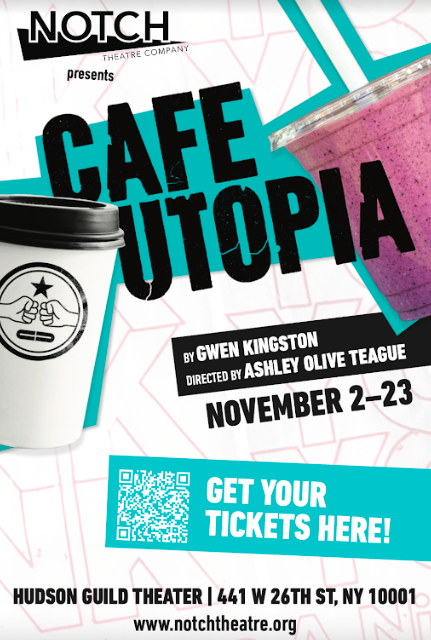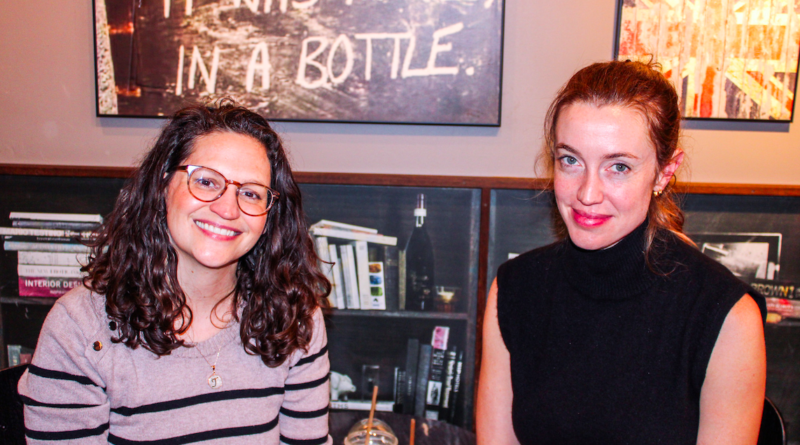INTERVIEW: The struggle for labor rights can be found at ‘Cafe Utopia’
Photo: Olive Teague and Gwen Kingston are the creative forces behind Cafe Utopia. Photo courtesy of Lucky Friday Design Studio / Provided by Emily Owens PR with permission.
Cafe Utopia, the new play by Gwen Kingston, envisions a corporate health food chain where there are flexible hours and awesome benefits for the employees, but that utopia quickly starts to descend into dystopia. And it’s up to the staff to push back on management, especially with a pending visit from the company’s CEO, according to press notes.
Helping Kingston bring this vision to life is Olive Teague, director of Cafe Utopia and artistic director of Notch Theatre Company, which is presenting the show at the Hudson Guild Theatre in New York City through Nov. 23. Union members can see the play for free; others have a suggested donation of $20.
Kingston has written four plays, been published in the Modern Love column in The New York Times and has her first novel out in the market. Teague has worked on several high-profile films, including Alice in Wonderland, Peeples and Promised Land, among others.
Recently Kingston and Teague exchanged emails with Hollywood Soapbox. Questions and answers have been slightly edited for style.
What inspired the creation of Cafe Utopia? Where did the idea come from?
TEAGUE: All of Notch Theatre’s work is built from community testimony. We put community and the issues our communities … at the heart of all our plays. We were approached, during the pandemic, by someone who was working at an Amazon warehouse in California and expressed an overwhelming need to get stories out about unionizing efforts and counter efforts to stop and silence unionizers.
From there, we conducted interviews and story circles with people at the forefront of unionizing across the nation and across industries — railroad workers, restaurant workers, factory workers, artists and students, everywhere from Bessemer, Alabama, to Buffalo, New York; Seattle, Washington; and Portland; Oregon. Then our brilliant playwright, Gwen Kingston, fashioned those stories into the moving and hilarious play you will see at Hudson Guild this November.
Although the show is a comedy, there are some serious considerations in the play about unions and labor rights, right?
TEAGUE: Right. That is a major reason why the play had to be an absurdist comedy. How do we get people to listen to and empathize with an issue this big and overwhelming? We can feel powerless in the fight against the huge, monied corporations that are shutting down unionizing efforts. How do we make this massive topic relatable and digestible?
At Notch we want our plays to be able to be performed on any regional stage across the country — to be touching and funny and entertaining, as well as galvanizing, able to support and move the needle on social justice movements.
KINGSTON: My first thought, when writing this play, was, “If I put this on stage, no one will believe it.” Some of the real-life instances of worker abuse were that outlandish! Very quickly my approach to the piece gravitated toward absurdism. I wanted to make something overtly ridiculous to get that disbelief out of the way and focus on the very real and insidious workplace power dynamics. I came up with an impossible product from an almost mythic creator and a workforce who would do his bidding with cult-like devotion. Ironically, I still think the true stories (several are sprinkled throughout the play as direct address monologues) are much wilder than anything I invented.
How is audience participation incorporated into the piece?
TEAGUE: Part of the play will change each night with the audience. Some nights union organizers will stand up and share their experiences. Some nights one of our original interviewees will speak. On other nights the audience will be asked to discuss a particular prompt with one another. Additionally, before the show, audience members are invited to write about their own experiences with unions, and later an actor or an audience member might come on stage to read one of those stories as a monologue. Those stories will also be collected in a lobby display across the life of the production.
How scary is it to premiere a brand-new play? Do you have to have trust in the director and cast?
TEAGUE: I am scared that the set might not be ready in time, that the flooring won’t arrive or a prop will be missing. But I feel nothing but joy and excitement about the play itself and the cast who are tasked with telling this story. I truly believe in this play and the people behind and within it. I cannot wait to share it with the world. -Olive Teague (Director and AD of Notch)
KINGSTON: It’s always vulnerable, but Olive and I have built trust over a lot of years and a lot of projects. Mostly, it’s just a huge joy to see the characters in your head come to life.
Is your writing process for plays similar to your writing process for prose?
KINGSTON: For me, any writing project begins with a kind of deep listening. Sometimes that’s an internal listening, but in this case I had hours of interviews to feed into that space. With a play, I nearly always begin the actual writing with two people talking to each other and let them teach me who they are: What do they want? What kind of words do they use? If they run out of relevant things to say, I add a third character and so on until it seems like all the voices I need are there.
Can theater change the world? Change perspectives?
KINGSTON: It certainly has in the past. Plays like Waiting for Lefty by Clifford Odets (a famous play about American labor) have led to protests and even riots. Stories are powerful, especially when the audience senses something real beneath all the artistry. But, I think our job is just to make the best version of the work we can. We can’t predict or prescribe the response. We can only cross our fingers and hope.
By John Soltes / Publisher / John@HollywoodSoapbox.com
Cafe Utopia, written by Gwen Kingston and directed by Olive Teague, continues through Nov. 23 at the Hudson Guild Theater in New York City. Click here for more information and tickets.


